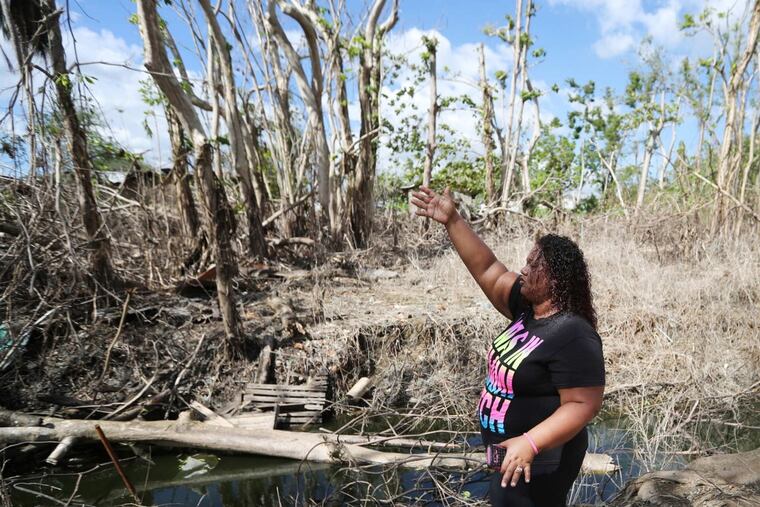In a flooded Puerto Rico town, help comes from Philly
In Florida, Puerto Rico, on Wednesday, a team of Red Cross volunteers including five men from Philadelphia handed out boxes of food and cases of water. It was the first relief truck in three weeks, and people were grateful for the help. But some whose homes were destroyed by flooding said they were really waiting for FEMA to arrive.

FLORIDA, Puerto Rico — Nearly six weeks after Hurricane Maria passed over this island, green has started to return, the patches of new leaves that now dot the once-barren mountains giving many hope that a rebirth is underway.
But Covalys Roman's backyard is all brown, an expanse of mud from which no grass can sprout. The flood washed away all the life.
"I didn't know how to get out," Roman said through a translator Wednesday, remembering how the shallow ditch behind her house filled with murky water, and how four feet of that water then filled her home. "Nobody could help. I called 20 times to 911 and nobody answered."
Earlier in the day she had waited at a nearby church as a team of Red Cross volunteers, five of them from Philadelphia, handed out food and bottled water.
"It was something I had to do," said Michael Bastone, an inspector with the Philadelphia Sheriff's Office who helped organize the trip.
His team, four others from the Sheriff's Office and one man who works for Peco, arrived in Puerto Rico on Oct. 15 to volunteer for three weeks. All have family on the island.
"I'm here to help what I consider my people," Sgt. Joshua Perez said. "I always say I wasn't birthed here, but you gave me life. Because once you drive around the island, you'll see how proud we are as Puerto Rican people, with the flags flying no matter the situation. The resiliency is beyond words."
He has seen cracks in that strength, too, like the man who was sleeping in his driveway on a wet mattress and said he wanted to be strong for his wife, then cried on Perez's shoulder. Perez cried, too.
For Bastone, that moment of heartache came Monday, when his team pulled over to help a man named Hector who was trying to nail a tarp over his bedroom.
The roof had been blown off, the walls opening up to an expansive sky and mountains that seemed to tower over him. Hector told them he could barely sleep at night, too afraid a mudslide would bring those mountains barreling down.
He was alone and out of food.
Bastone said his team had already given out all its supplies that day. So the men gave him cash, some donated by people in Philadelphia, some from their own wallets.
Bastone said the experience left him emotionally spent. "We were done," he said. "We were done, done, done."
He said he got up the next day and kept working, knowing Hector was "just one of many" in need.
They have worked every day on the island, forgoing their scheduled days off because not working would mean two trucks not going out to people in need.
When the Red Cross caravan arrived in Florida on Wednesday, the truck driver pumping the horn as he pulled into the parking lot, the 50 people waiting in line broke into cheers.
Moving quickly, the volunteers unloaded the truck, then heaved the items into people's outstretched arms. The boxes of food and cases of water were brought back to homes missing roofs and reeking of mildew, a smell that permeates the town.
"I don't have no idea" when FEMA will come, said Edith Negron Gonzalez, 67, leaning for support against her second-story balcony and resting her hand on the palm-size lump on her chest.
She said that she doesn't know what caused the mass but that it grows when she is stressed. The swelling hasn't subsided since the storm.
Facing the street, she had tacked a yellow piece of paper that gave FEMA permission to make repairs to her roof, which was severely damaged during the storm.
A FEMA spokesman Wednesday said the agency was working to respond to such requests in Florida and Puerto Rico's 77 other municipalities but said the Puerto Rican government is leading the effort. Due to the "prolonged time frame" that many will be without power, FEMA will consider providing those that are still waiting generators, the spokesman said.
In the meantime, Negron Gonzalez's son fashioned a makeshift roof, a patchwork of tarps and metal slats dotted with holes.
Like Roman and many others in town, Negron Gonzalez only returned to her home when the shelter closed a little more than a week ago. The first floor had flooded with six feet of water, a line marked by an arrow drawn in black spray paint at the front door.
She and her son now sleep on cots in a second-floor bedroom, beneath mosquito nets that are tacked to the walls to make a cage around each bed. They wake each morning to see the bugs have found their way in.
How they are living like this, she said, she doesn't know. Yet somehow they are.
"Only God is going to kill me," she said. "He gave me life. He will take it away."